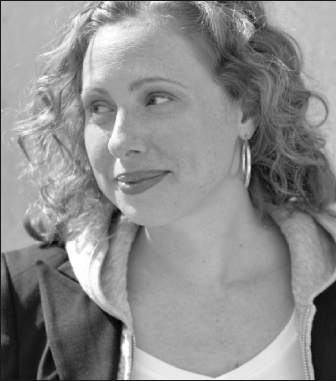By Will McKinley
It’s Friday night and writer Janice Erlbaum is at a diner in Chelsea, eating grapefruit and whole-wheat toast. It’s a radical departure from her life two decades ago as a “halfway homeless” high school student with a penchant for hard drugs and risky choices.
As chronicled in “GirlBomb: A Halfway Homeless Memoir” (now out in paperback), Erlbaum fled a toxic home at the age of 15 and began an uncertain and frightening journey through the youth shelters of New York City. Her adolescence was a poisonous cocktail of substance abuse, survival sex and brushes with death. And you thought your teen years were tough.
“Girlbomb” is a literary gut punch — an unflinchingly honest, and disarmingly witty tale of a young woman who plunged headfirst into an abyss of betrayal and self-hate. Now, twenty years later, Erlbaum is exactly where she always hoped to be.
WILL McKINLEY: You just got an award from the New York Public Library for the book.
JANICE ERLBAUM: Yes. I got two awards, which was a great honor — “25 Books to Remember” for 2006 and the 2007 “Books for the Teen Age” list.
There’s a lot of heavy stuff in your book. Are parents really saying, “Here, my 15-year-old daughter, read this?”
I think parents see it as a cautionary tale. I don’t make promiscuous sex look particularly good, nor do I make drugs sound particularly fun. I get emails from young women saying, “I read your book and I’m having trouble at home and I don’t know what to do.” And I always say, “If your parents are being abusive, rat them out to somebody official. And get it on paper, so they are the ones who have to suffer the repercussions, not you.” I don’t glamorize running away.
In the “Thanks” section of your book you speak in relatively glowing terms about both of your parents, but in the book you describe your father as abusive.
And rightly so. But he’s a radically different person than he was. We went through some tough stuff and then we reconciled. Now he’s one of my closest friends.
And how about your mother?
I love my mom but we don’t speak or see each other. I told her about the book and she hasn’t read it, which I think is a good choice for her. She had it hard too. I forgive her.
Does being sober help or hurt your writing?
I was an extremely productive pothead. I wrote the book totally stoned. But I don’t feel like my writing has changed since I stopped doing drugs. I think the effects of drugs on creativity are overrated.
What has filled that void for you in your life?
I don’t know. The Internet?
Did you know that on Amazon.com they’re packaging your book with “The Diary of Anne Frank?”
It changes. For a while it was Sylvia Plath.
So, put your head in the oven and then read “Girlbomb.”
Exactly. I’m honored to be in the company of great women writers that I read in my formative years. But I’m like, “Gee, is my book that depressing?” I would love to know what algorithm paired us.
Washington Square Park is almost like a character in the book. Are you able to walk through the park now and look it as just a park, or is it a minefield of memories?
All of New York is a minefield. I went to the High School for the Humanities in Chelsea. The shelter was in midtown. The character of Washington Square Park has changed so unbelievably much that it is hard not to see it in a different light. Nothing’s going on there anymore because NYU bought it. They put their cameras in the trees and there are cops all over the place, so the youth culture moved. Now the kids congregate in Union Square — the homeless kids, the skateboarders, the drugs. I am glad there’s another place, a new territory for the kids to be kids, to hang out and experiment. The ’80s was the golden age of unfettered underage partying in New York. Open containers, smoking joints on the street — that was pre-Giuliani New York. So it’s not just Washington Square that’s changed, the whole character of the city changed.
Have you ever considered having kids?
Considered it? Yes. Gonna do it? No. My next book is all about going back to the shelter as a volunteer. I met a girl there who I basically fell in non-romantic love with, and was pursuing becoming her legal guardian. In that sense, I’ve definitely considered having kids. I almost legally adopted a 19-year-old ex-junkie.
At the end of “Girlbomb” you write, “Maybe in 20 years I’ll look back and say, ‘Look where I wound up. That was the worst mistake of my life.’ Or maybe I’ll be happy; maybe I’ll be doing really well and I’ll say, ‘I’m glad I was there, it made me who I am.’ ” So, which is it?
Number two. I have a very nice, stable life. I live in a lovely apartment. I have a wonderful stable partner. I don’t know how much I would appreciate all that if I didn’t go through what I went through. I’m not glad I had to go through it, but I don’t regret it.
What do you think the 17-year-old Janice would think of the 37-year-old Janice?
She is very happy that we’re a writer. That’s all she ever wanted to be.
She likes having a nice apartment. She’s a little disappointed that we don’t go clubbing anymore. We watch reality TV and we’re in bed by 11:30. We’re kind of lame.
Janice Erlbaum will be reading an excerpt from “Girlbomb: A Halfway Homeless Memoir” on Monday, April 23 at 10 p.m. at the Bowery Poetry Club, 308 Broadway.





























